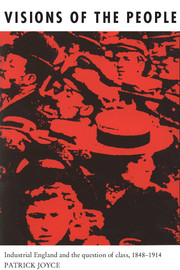Book contents
- Frontmatter
- Contents
- List of plates
- Acknowledgements
- 1 Introduction: beyond class?
- PART I POWER AND THE PEOPLE: POLITICS AND THE SOCIAL ORDER
- PART II MORALISING THE MARKET: WORK AND THE SOCIAL ORDER
- PART III CUSTOM, HISTORY, LANGUAGE: POPULAR CULTURE AND THE SOCIAL ORDER
- PART IV KINGDOMS OF THE MIND: THE IMAGINARY CONSTITUTION OF THE SOCIAL ORDER
- 9 Investigating popular art
- 10 The broadside ballad
- 11 The voice of the people? The character and development of dialect literature
- 12 Dialect and the making of social identity
- 13 Stages of class: popular theatre and the geography of belonging
- 14 Summary and conclusion: the making of the English working class before 1914?
- Appendices
- Bibliographical note
- Notes
- Index
9 - Investigating popular art
Published online by Cambridge University Press: 05 March 2012
- Frontmatter
- Contents
- List of plates
- Acknowledgements
- 1 Introduction: beyond class?
- PART I POWER AND THE PEOPLE: POLITICS AND THE SOCIAL ORDER
- PART II MORALISING THE MARKET: WORK AND THE SOCIAL ORDER
- PART III CUSTOM, HISTORY, LANGUAGE: POPULAR CULTURE AND THE SOCIAL ORDER
- PART IV KINGDOMS OF THE MIND: THE IMAGINARY CONSTITUTION OF THE SOCIAL ORDER
- 9 Investigating popular art
- 10 The broadside ballad
- 11 The voice of the people? The character and development of dialect literature
- 12 Dialect and the making of social identity
- 13 Stages of class: popular theatre and the geography of belonging
- 14 Summary and conclusion: the making of the English working class before 1914?
- Appendices
- Bibliographical note
- Notes
- Index
Summary
In late February 1933, Gracie Fields visited her home town of Rochdale. This is how the special correspondent of the Sunday Chronicle described those wintry days:
I write in humility of Rochdale, and of Gracie Fields, the great comedienne. Something has been happening in this mill-haunted town this week which could not happen in any other place in the world.
Once – and not so very long ago – Gracie Fields wore real clogs and a real shawl, and worked in a mill in Rochdale.
So she left Rochdale and became well known. Then famous. Then world famous. Her income grew larger and larger…
And, six days ago, she came home to Rochdale to stay for a week in order to raise money for the local unemployed by singing for nothing at the Rochdale Theatre Royal.
HER PEOPLE'S HOMAGE
Now I, who have been watching these happenings here this week, tell you that no queen in her own country ever received greater homage or was more ecstatically cheered and adored by her people.
But it was not in civic welcome, visits to institutions, receptions etc., that made her Queen of Rochdale. It was the breathless joy of everybody in her presence.
Did she walk in the park – then a hundred and fifty mothers walked proudly after her. Did she call in a shop – then a crowd quickly collected outside. Did she wave a hand – then scores of hands and hats and handkerchiefs waved back. Yes, every day this week. […]
- Type
- Chapter
- Information
- Visions of the PeopleIndustrial England and the Question of Class, c.1848–1914, pp. 215 - 229Publisher: Cambridge University PressPrint publication year: 1991



